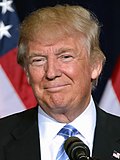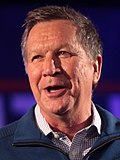| Poll source | Date | 1st | 2nd | 3rd | Other |
|---|
|
| Primary results [12] | March 1, 2016 | Donald Trump38.81% | Marco Rubio24.45% | Ted Cruz23.60% | Ben Carson 6.23%, John Kasich 5.69%, Jeb Bush 0.69%, Rand Paul 0.22%, Mike Huckabee 0.20%, Chris Christie 0.11%, Carly Fiorina 0.09%, Rick Santorum 0.04%, Lindsey Graham 0.03%, George Pataki 0.02%, |
| SurveyMonkey [13] Margin of error: ± ?% Sample size: 1171 | February 22–29, 2016 | Donald Trump
39% | Ted Cruz 21% | Marco Rubio 20% | Ben Carson 9%, John Kasich 6%, Undecided 6% |
| Landmark/RosettaStone [14] Margin of error: ± 2.6% Sample size: 1400 | February 28, 2016 | Donald Trump
39% | Marco Rubio 20% | Ted Cruz 15% | Ben Carson 9%, John Kasich 8%, Undecided 9% |
| Opinion Savvy/Fox 5 Atlanta [15] Margin of error: ± 3.7% Sample size: 710 | February 27–28, 2016 | Donald Trump
32.5% | Marco Rubio 23.2% | Ted Cruz 23.2% | John Kasich 10.7%, Ben Carson 6.1%, Undecided 4.3% |
| Trafalgar Group [16] Margin of error: ± 3.14% Sample size: 1350 | February 26–28, 2016 | Donald Trump
38.6% | Marco Rubio 23.54% | Ted Cruz 20.74% | John Kasich 7.03%, Ben Carson 6.14%, Undecided 3.95% |
| CBS/YouGov [17] Margin of error: ± 7% Sample size: 493 | February 22–26, 2016 | Donald Trump
40% | Ted Cruz 29% | Marco Rubio 22% | Ben Carson 7%, John Kasich 2% |
| ResearchNOW/WABE [18] Margin of error: ± 4.1% Sample size: 400 | February 22–24, 2016 | Donald Trump
41% | Marco Rubio 18% | Ted Cruz 15% | Ben Carson 8%, John Kasich 7%, Undecided 10% |
| SurveyUSA/TEGNA [19] Margin of error: ± 3.8% Sample size: 684 | February 22–23, 2016 | Donald Trump
45% | Marco Rubio 19% | Ted Cruz 16% | Ben Carson 8%, John Kasich 6%, Other 1%, Undecided 5% |
| Opinion Savvy/Fox 5 Atlanta [20] Margin of error: ± 3.6% Sample size: 745 | February 22–23, 2016 | Donald Trump
33.6% | Marco Rubio 22.2% | Ted Cruz 20.4% | John Kasich 8.9%, Ben Carson 7.7%, Undecided 7.2% |
| NBC News/Wall Street Journal/Marist [21] Margin of error: ± 4.2% Sample size: 543 | February 18–23, 2016 | Donald Trump
30% | Ted Cruz 23% | Marco Rubio 23% | Ben Carson 9%, John Kasich 9% |
| Landmark/RosettaStone [22] Margin of error: ± 4.4% Sample size: 500 | February 21, 2016 | Donald Trump
31.7% | Marco Rubio 22.7% | Ted Cruz 18.7% | Ben Carson 8.1%, John Kasich 7.9%, Undecided 10.9% |
| Landmark/RosettaStone [23] Margin of error: ± 4.4% Sample size: 500 | February 4, 2016 | Donald Trump
27.3% | Ted Cruz 18.3% | Marco Rubio 18.2% | Ben Carson 7.7%, John Kasich 4.4%, Chris Christie 3.9%, Jeb Bush 3.0%, Carly Fiorina 1.8%, Undecided 15.4% |
| CBS/YouGov [24] Margin of error: ± 6.2% Sample size: 494 | January 18–21, 2016 | Donald Trump
39% | Ted Cruz 29% | Marco Rubio 13% | Ben Carson 6%, Jeb Bush 2%, Chris Christie 2%, Carly Fiorina 2%, Mike Huckabee 2%, John Kasich 2%, Jim Gilmore 0%, Rand Paul 0%, Rick Santorum 0%, No preference 1% |
| Opinion Savvy/Fox 5 Atlanta [25] Margin of error: ± 3.4% Sample size: 803 | January 17, 2016 | Donald Trump
33.4% | Ted Cruz 23.4% | Marco Rubio 8.2% | Ben Carson 7.3%, Jeb Bush 7.1%, John Kasich 3.8%, Chris Christie 3.7%, Carly Fiorina 3.5%, Rand Paul 3.5%, Mike Huckabee 3.2%, Rick Santorum 0.1%, Undecided 2.7% |
| Opinion Savvy/Fox 5 Atlanta [26] Margin of error: ± 4.2% Sample size: 538 | December 16, 2015 | Donald Trump
34.6% | Ted Cruz 15.8% | Marco Rubio 12% | Ben Carson 6.4%, Jeb Bush 6%, Chris Christie 5.6%, Carly Fiorina 5.1%, John Kasich 2.3%, Rand Paul 2.1%, Lindsey Graham 1.4%, Mike Huckabee 1.4%, George Pataki 0.5%, Undecided 6.8% |
| WSB TV/Landmark [27] Margin of error: ±3.3% Sample size: 800 | December 10, 2015 | Donald Trump
43.3% | Ted Cruz 16.2% | Marco Rubio 10.6% | Ben Carson 6.7%, Jeb Bush 4.8%, Mike Huckabee 1.9%, Carly Fiorina 1.8%, John Kasich 1.5%, Rand Paul 0.5%, Undecided 12.9% |
| FOX 5/Morris News [28] Margin of error: ±4.7% Sample size: 674 | November 9–10, 2015 | Ben Carson
26% | Donald Trump
24% | Ted Cruz 14% | Marco Rubio 9%, Jeb Bush 8%, Carly Fiorina 6% |
| WXIA-TV/SurveyUSA [29] Margin of error: ±2% Sample size: 2,075 | October 26, 2015 | Donald Trump
35% | Ben Carson 28% | Marco Rubio 12% | Ted Cruz 8%, Jeb Bush 4%, Carly Fiorina 3%, Mike Huckabee 3%, John Kasich 2% |
| WSB/Landmark [30] Margin of error: ±4% Sample size: 600 | September 23, 2015 | Donald Trump
30.8% | Ben Carson 17.9% | Carly Fiorina 13.2% | Marco Rubio 9.4%, Ted Cruz 7.9%, Jeb Bush 7.5%, Mike Huckabee 4.4%, John Kasich 1.9%, Rand Paul 1.1%, Undecided 5.9% |
| Opinion Savvy [31] Margin of error: ±3.8% Sample size: 664 | September 3, 2015 | Donald Trump
34.2% | Ben Carson 24.8% | Jeb Bush 10.9% | Ted Cruz 6.3%, Mike Huckabee 5.1%, Carly Fiorina 4.5%, John Kasich 2.5%, Marco Rubio 2.1%, Chris Christie 2%, Scott Walker 1.9%, Rick Perry 0.1%, Rick Santorum 0.1%, Bobby Jindal 0.1%, Lindsey Graham 0.1%, Rand Paul 0%, George Pataki 0%, Someone else 1.8%, Undecided 3.5% |
| WSB/Landmark [32] Margin of error: ± 4.0% Sample size: 600 | August 5, 2015 | Donald Trump
34.3% | Jeb Bush 12.0% | Scott Walker 10.4% | Mike Huckabee 8.1%, Ben Carson 8.1%, Ted Cruz 5.4%, John Kasich 4.5%, Marco Rubio 4.5%, Chris Christie 2.8%, Rand Paul 2.4%, Undecided 7.5% |
| 5 Atlanta/Morris News Service [33] Margin of error: ± 4.1% Sample size: 569 | August 3, 2015 | Donald Trump
30.4% | Jeb Bush 17.3% | Ben Carson 9.6% | Mike Huckabee 6.5%, Ted Cruz 5.9%, Scott Walker 5%, Rand Paul 3.4%, Chris Christie 3.2%, Marco Rubio 3% John Kasich 2.8%, Carly Fiorina 2.5% Rick Perry 2.1% Bobby Jindal 1.7%, Lindsey Graham 0.4%, George Pataki 0.2%, Rick Santorum 0.1%, Other/No opinion 5.9% |
| Landmark Communications/Rosetta Stone [34] Margin of error: ± 4.3% Sample size: 500 | May 11–12, 2015 | Mike Huckabee
18.3% | Ben Carson
15.4% | Scott Walker 12.6% | Jeb Bush 10.1%, Marco Rubio 9.6%, Ted Cruz 9.3%, Rand Paul 4%, Carly Fiorina 2.6%, Chris Christie 2.2%, Rick Santorum 0.3%, Other/No opinion 15.6% |
| Insider Advantage [35] Margin of error: ± ? Sample size: 200 | February 4, 2015 | Jeb Bush
21.5% | Scott Walker 17.3% | Mike Huckabee 16.4% | Ben Carson 15.5%, Rick Perry 7.2%, Rand Paul 3.9%, Marco Rubio 3.9%, Chris Christie 3%, Donald Trump 1.9%, Other/No opinion 9.5% |







